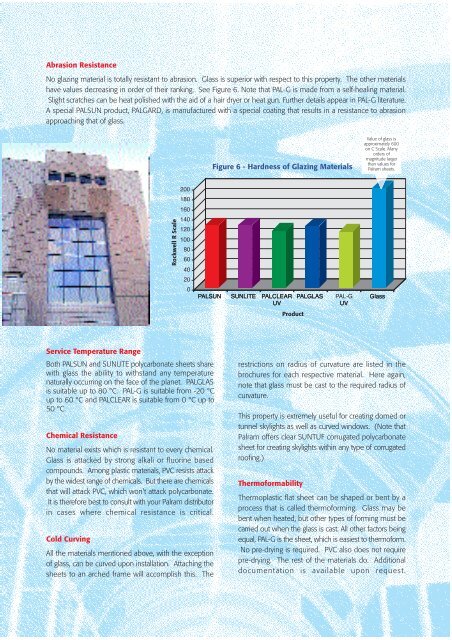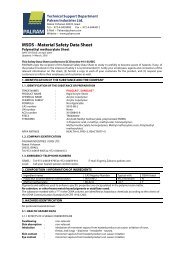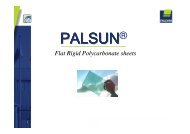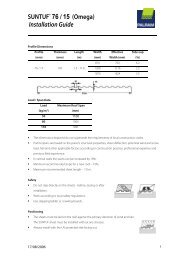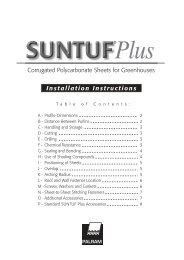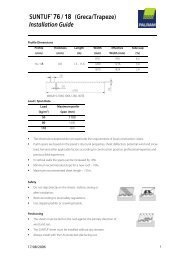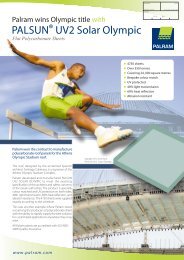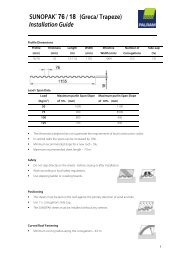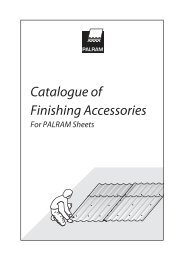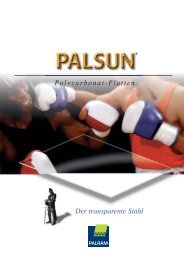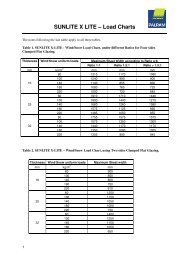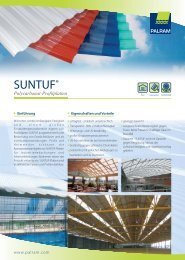with Palram Clear Sheets
with Palram Clear Sheets
with Palram Clear Sheets
You also want an ePaper? Increase the reach of your titles
YUMPU automatically turns print PDFs into web optimized ePapers that Google loves.
Abrasion Resistance<br />
No glazing material is totally resistant to abrasion. Glass is superior <strong>with</strong> respect to this property. The other materials<br />
have values decreasing in order of their ranking. See Figure 6. Note that PAL-G is made from a self-healing material.<br />
Slight scratches can be heat polished <strong>with</strong> the aid of a hair dryer or heat gun. Further details appear in PAL-G literature.<br />
A special PALSUN product, PALGARD, is manufactured <strong>with</strong> a special coating that results in a resistance to abrasion<br />
approaching that of glass.<br />
Figure 6 - Hardness of Glazing Materials<br />
Value of glass is<br />
approximately 600<br />
on C Scale. Many<br />
orders of<br />
magnitude larger<br />
than values for<br />
<strong>Palram</strong> sheets.<br />
200<br />
180<br />
160<br />
Rockwell R Scale<br />
140<br />
120<br />
100<br />
80<br />
60<br />
40<br />
20<br />
0<br />
PALSUN SUNLITE PALCLEAR<br />
UV<br />
PALGLAS<br />
PAL-G<br />
UV<br />
Glass<br />
Product<br />
Service Temperature Range<br />
Both PALSUN and SUNLITE polycarbonate sheets share<br />
<strong>with</strong> glass the ability to <strong>with</strong>stand any temperature<br />
naturally occurring on the face of the planet. PALGLAS<br />
is suitable up to 80 °C. PAL-G is suitable from -20 °C<br />
up to 60 °C and PALCLEAR is suitable from 0 °C up to<br />
50 °C.<br />
Chemical Resistance<br />
No material exists which is resistant to every chemical.<br />
Glass is attacked by strong alkali or fluorine based<br />
compounds. Among plastic materials, PVC resists attack<br />
by the widest range of chemicals. But there are chemicals<br />
that will attack PVC, which won't attack polycarbonate.<br />
It is therefore best to consult <strong>with</strong> your <strong>Palram</strong> distributor<br />
in cases where chemical resistance is critical.<br />
Cold Curving<br />
All the materials mentioned above, <strong>with</strong> the exception<br />
of glass, can be curved upon installation. Attaching the<br />
sheets to an arched frame will accomplish this. The<br />
restrictions on radius of curvature are listed in the<br />
brochures for each respective material. Here again,<br />
note that glass must be cast to the required radius of<br />
curvature.<br />
This property is extremely useful for creating domed or<br />
tunnel skylights as well as curved windows. (Note that<br />
<strong>Palram</strong> offers clear SUNTUF corrugated polycarbonate<br />
sheet for creating skylights <strong>with</strong>in any type of corrugated<br />
roofing.)<br />
Thermoformability<br />
Thermoplastic flat sheet can be shaped or bent by a<br />
process that is called thermoforming. Glass may be<br />
bent when heated, but other types of forming must be<br />
carried out when the glass is cast. All other factors being<br />
equal, PAL-G is the sheet, which is easiest to thermoform.<br />
No pre-drying is required. PVC also does not require<br />
pre-drying. The rest of the materials do. Additional<br />
documentation is available upon request.


